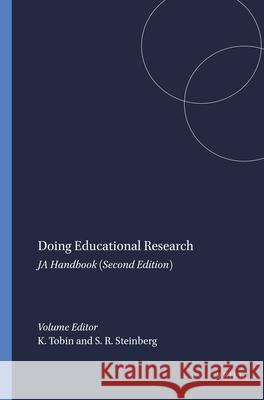Doing Educational Research (Second Edition) » książka
Doing Educational Research (Second Edition)
ISBN-13: 9789463000758 / Angielski / Twarda / 2015 / 536 str.
Doing Educational Research (Second Edition)
ISBN-13: 9789463000758 / Angielski / Twarda / 2015 / 536 str.
(netto: 419,90 VAT: 5%)
Najniższa cena z 30 dni: 425,63
ok. 22 dni roboczych.
Darmowa dostawa!
In the second edition of Doing Educational Research, we explore a variety of critical issues and methodologies. Authors include some of the most influential voices selected from across the spectrum of career disciplines. The scholars provide detailed insights into dimensions of the research process that engage both students and experienced researchers with key concepts and recent innovations in the art of doing research. The contributors adopt a stance that is practical as it introduces beginning scholars to social inquiry, and innovative as it transforms the boundaries of conversations about educational research. Doing Educational Research appears at a critical moment in which educational researchers are pushed to align with a pervasive scientism that embraces tenets of crypto-positivism. The book addresses logics of inquiry, underpinning cutting-edge approaches to educational research that extend far beyond limited visions that are presented through the lenses of positivism. The chapters explore a variety of methodologies including action research, bricolage, ethnography, hermeneutics, historiography, media-based research, psychoanalysis, and conversation analysis, in a matrix of social theory, authentic inquiry, critical pedagogy, and differences in epistemology, ontology, and axiology. A diverse array of complex topics are presented in accessible forms and will compel both scholars and students.
In the second edition of Doing Educational Research, we explore a variety of critical issues and methodologies. Authors include some of the most influential voices selected from across the spectrum of career disciplines. The scholars provide detailed insights into dimensions of the research process that engage both students and experienced researchers with key concepts and recent innovations in the art of doing research. The contributors adopt a stance that is practical as it introduces beginning scholars to social inquiry, and innovative as it transforms the boundaries of conversations about educational research. Doing Educational Research appears at a critical moment in which educational researchers are pushed to align with a pervasive scientism that embraces tenets of crypto-positivism. The book addresses logics of inquiry, underpinning cutting-edge approaches to educational research that extend far beyond limited visions that are presented through the lenses of positivism. The chapters explore a variety of methodologies including action research, bricolage, ethnography, hermeneutics, historiography, media-based research, psychoanalysis, and conversation analysis, in a matrix of social theory, authentic inquiry, critical pedagogy, and differences in epistemology, ontology, and axiology. A diverse array of complex topics are presented in accessible forms and will compel both scholars and students.











